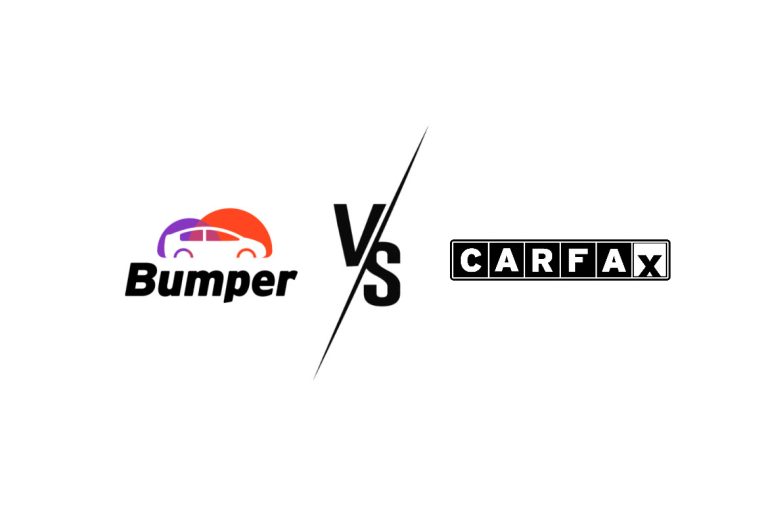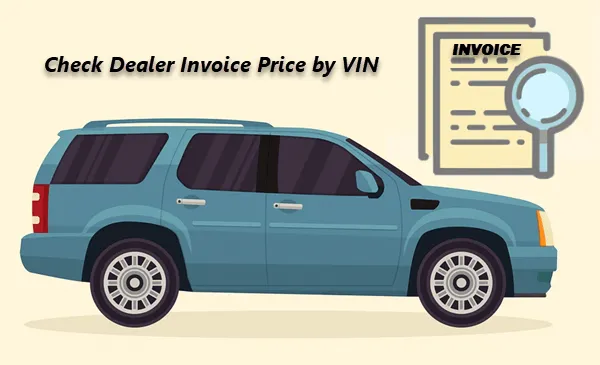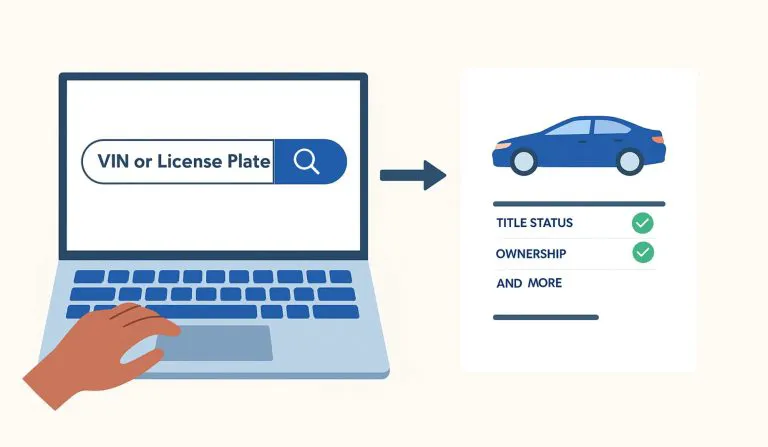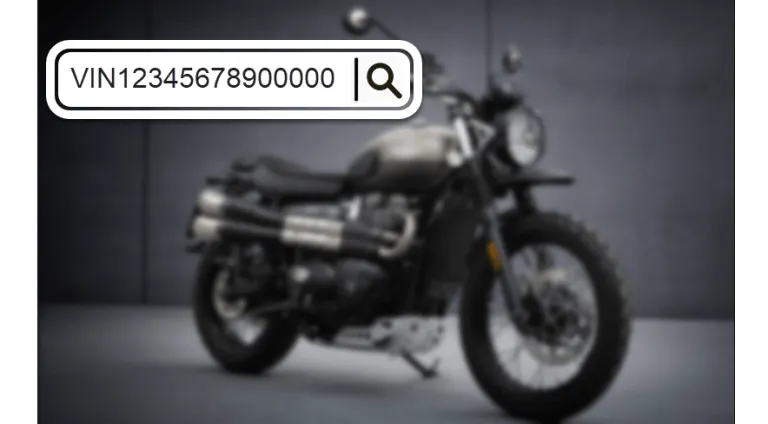How to Check If a Car Is Stolen: A Guide for Used Car Buyers
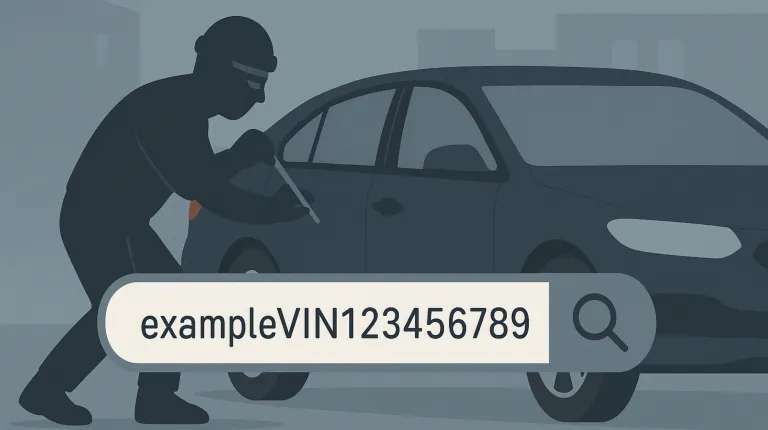
Buying a used car can save you money, but if the vehicle turns out to be stolen, the consequences can be serious. You could lose both the car and the money you paid for it, and in some cases, you might even face legal trouble. That’s why it’s crucial to check if a car is stolen in the first place before finalizing the deal, especially if you buy from a private seller 1.
In this guide, we’ll walk you through how to know if a car is stolen and what signs to look for so you can buy with confidence. We’ll also briefly cover what you can do if you spot a car in your neighborhood that you suspect might be stolen. Let’s dive in!
Table of contents
- 1. Use NICB’s VINCheck tool
- 2. Check Digitpol’s stolen car database
- 3. Search State-level stolen vehicle databases
- 4. Get a vehicle history report
- 5. Contact the local police or state law enforcement
- Can you check if a car is stolen by license plate?
- Watch out for VIN swapping
- What to do if you suspect a car might be stolen
Why should you check if a vehicle is stolen?
Buying a stolen car can lead to serious consequences:
- The car may be seized and returned to its rightful owner.
- You won’t get your money back.
- You could be investigated, even if you had no idea the car was stolen.
One car buyer shared his own story2 on a forum: he bought a used vehicle through an online marketplace. The seller had the title, and the transfer went smoothly. But a year later, police showed up at his door—the car had been reported stolen, and they took it away. He had to hire a lawyer to sort everything out while also trying to track the seller down himself. Even though things were eventually resolved, it cost him time, money, and stress.
All this is to say, it’s crucial to take precautions upfront. It’s much easier than dealing with the aftermath.
The “clean” title myth
Used car buying 101: Just because a car comes with a title that looks clean doesn’t mean it’s legit. In fact, fake titles are everywhere and surprisingly easy to buy or forge. You’ve probably heard stories of stolen cars being sold with convincing fake paperwork — not only fake title certificates, but also forged bills of sale, registration cards, or other documents. That’s why a clean title alone isn’t enough. You need to do your homework and dig much deeper.
Locate the VIN
Before you start your research, make sure you have the VIN (Vehicle Identification Number) of the car you want to check. While using the license plate can be an option, plates are much easier to fake or swap. In contrast, a VIN is unique to each vehicle and harder to alter, making it a more reliable identifier. That’s why locating the car’s VIN is a crucial first step.
💡 If you have difficulty locating the VIN, you can refer to this article for help.
1. Use NICB’s VINCheck tool
The NICB website is the first place you should check. It’s a well-known, easy-to-use database that’s completely free.
The NICB is a nonprofit organization backed by the insurance industry. It plays a critical role in preventing and investigating vehicle theft and insurance fraud. On its website, the NICB offers a free lookup tool that allows the public to check whether a specific VIN has a record of an insurance theft claim (and not yet recovered), or reported as a salvage vehicle 3 by participating NICB member insurance companies.
To use the NICB VINCheck service, simply visit the official NICB VINCheck website and enter the 17-character VIN of the vehicle you want to investigate. After completing a quick CAPTCHA verification, submit the search.
The tool will then indicate whether the vehicle has any reported theft or total loss records in the NICB database. The screenshot below shows what it looks like when a vehicle is flagged as being listed in their theft records.
🔔 Limitations of the tool
While it’s a convenient tool, NICB theft and salvage records only reflect what is reported by member insurance companies and do not include law enforcement data. If a vehicle was indeed stolen but the incident didn’t involve an insurance company, or the insurer is not part of the NICB network, then the NICB may not have a record of the theft. So, NICB results alone aren’t foolproof and it’s a good idea to supplement them with checks from other databases.
Also, the NICB typically reflects if a car is currently reported stolen. Once recovered, its stolen status might be removed subsequently.
2. Check Digitpol’s stolen car database
Digitpol’s Stolen Car Database is an international database of stolen vehicles such as cars, boats, motorbikes, and trucks. This International stolen vehicle database contains the registration of stolen, wanted, and embezzled vehicles from the USA, UK, Europe, Asia, Africa and Pacific. By combining global reach, real-time alerts, and forensic investigation support, it fills gaps left by national law enforcement databases.
To run your search, just go to the inventory page where all reported stolen vehicles are listed. Then, use the filter tool as shown below: enter the VIN, select Sort by VIN and click Search.
If theft data is available, it often includes very detailed information, such as the vehicle’s make and model, color, location and date of the theft, and the license plate number.
3. Search State-level stolen vehicle databases
Some states offer public-facing tools for checking stolen vehicle records. These databases usually contain stolen property information reported to the state’s Department of Law Enforcement by local law enforcement agencies and cleared for public release.
To find them, try Googling the name of the state along with keywords like “stolen vehicle search” (e.g. “Florida stolen vehicle search“). In the search results, look for an official government website, usually one that ends in .gov or is clearly affiliated with a state agency. Then just follow the instructions on the page and enter the required information, like the VIN, to run the search.
4. Get a vehicle history report
This is one of the easiest and most straightforward ways to check for theft and other red flags. Unlike tools like NICB that rely on specific sources, vehicle history report providers pull data from a wide range of sources and compile it into a detailed and easy-to-read report.
What’s more, some theft databases may remove a record once the vehicle is recovered. But a vehicle history report can reveal whether a car was ever reported stolen (theft history), even if it happened years ago.
Besides theft records, a history report offers plenty of other valuable clues to help you determine whether a car is legit. For example, many reports include year-by-year registration records and detailed ownership history, both of which might help you spot inconsistencies or signs of suspicious activity.
Now comes the big question: Which report provider should you choose?
Actually, there’s no one-size-fits-all answer. The right choice depends on several factors, such as price, depth of information, data sources, and which aspects you care about most. It’s worth comparing a few options to find the best fit for your needs.
AutoCheck
Backed by Experian, AutoCheck is a major player in the VIN check industry. Compared to other services, it has several key advantages. For one, its strong industry presence gives it access to a robust network of automotive data sources. When it comes to identifying stolen vehicles, AutoCheck pulls data from state motor vehicle agencies, partnered insurance companies, and law enforcement agencies4.
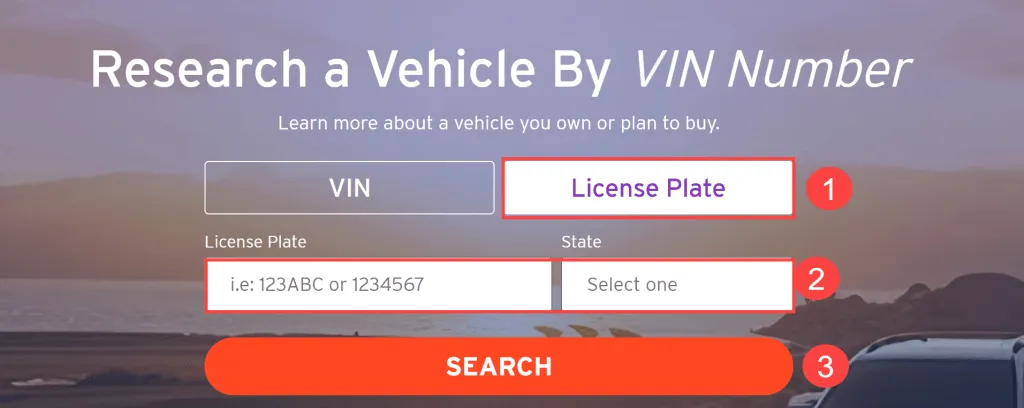
Its reports are also especially clear and well-organized. They’re structured in two layers—starting with a summary of key vehicle checks, followed by a chronological timeline that shows exactly what happened and when. It has a unique feature: the AutoCheck Score, which rates a vehicle’s history on a numerical scale. By comparing that score to similar vehicles, you get a quick sense of how this car’s history stacks up.
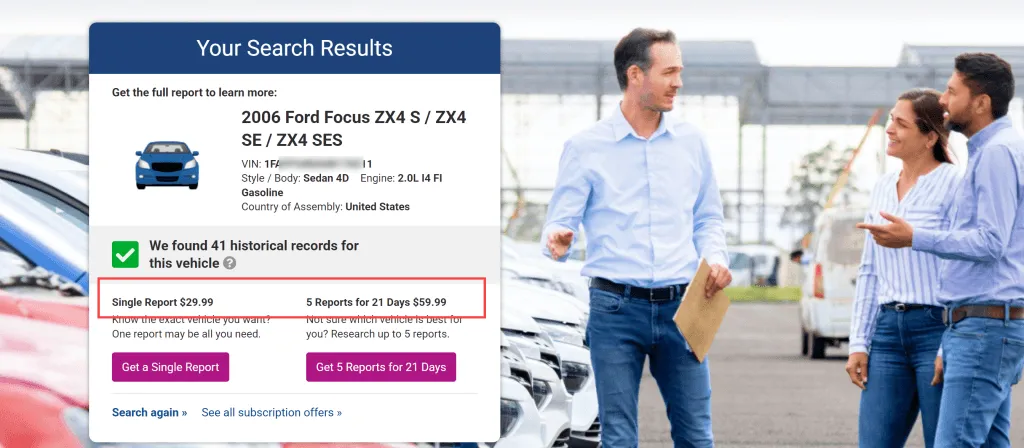
In an AutoCheck report, theft-related information is listed under the “Additional History” section. If it shows an event reported there, you can scroll down to the detailed timeline to find the specific theft record, including when and where it occurred and who reported it.
💡 Quick tip: Press Ctrl + F in your browser and type “stolen” to quickly locate any records that mention theft in the report.
Bumper
Bumper is a relatively young and dynamic brand in the vehicle history report field. While it may not be as well-known as AutoCheck, Bumper is one of the few NMVTIS-approved providers. That means it pulls data directly from the National Motor Vehicle Title Information System, a federal database which tracks vehicle titles, salvage declarations, and insurance total losses.
According to Bumper’s data source disclosure, Theft data included in Bumper reports originates from FBI National Crime Information Center (NCIC)5. It’s a governmental system that receives vehicle theft data from approximately 18,000 criminal justice agencies and other law enforcement authorities throughout the United States.
Notably, NCIC’s data includes stolen vehicles that are self-insured or uninsured, which may not show up in other insurance-based databases.
Bumper reports are also easy to read, thanks to the sidebar navigation. Once you get your report, just click on Theft Records under the Vehicle History section, and it’ll take you straight to the relevant details.
Bumper is budget-friendly, and with a subscription, you can run up to 50 reports per month, making it a great option if you’re checking multiple vehicles.
Another big convenience of Bumper is that it lets you search in multiple ways. While most services only allow you to search by VIN, Bumper also gives you the option to search using a license plate number, which can be handy when the VIN is hard to access.

Can I check if a car is stolen using a free VIN check website?
When it comes to checking theft data, we generally don’t recommend free websites. There’s a reason why paid services charge a fee—they aggregate data from official government agencies and a wide range of industry partners. These partnerships and the data processing involved come at a cost.
In our own testing, we found that free reports often lack both accuracy and depth. We checked several real VINs that showed clear theft records on platforms like Bumper, AutoCheck, and the NICB, and the free reports showed nothing at all, appearing completely clean.
5. Contact the local police or state law enforcement
In addition to doing your own research online, you can bring the vehicle’s VIN to the local police department or state troopers and ask them to check whether the car has ever been reported stolen. Most departments are willing to help, especially if you explain that you’re a private buyer trying to make sure you’re not purchasing a stolen vehicle.
This is often the most direct and reliable way to verify theft status, since police have access to up-to-date law enforcement databases like the FBI’s National Crime Information Center (which, as mentioned earlier, is also one of Bumper’s key data sources).
Can you check if a car is stolen by license plate?
Yes, it’s possible to check if a car is stolen using a license plate, but it’s not always as reliable or thorough as checking with the VIN, since plates can be swapped easily, especially on stolen cars. But if that’s all you have at hand, you can definitely give it a shot.
As far as we know, the NICB doesn’t offer a license plate search option. However, some vehicle history report services (like Bumper, BeenVerified) allow you to search by license plate + state. If they find a match, they’ll pull up the associated VIN and provide a report, which may include theft records if available.
Pro tips for used car buyers
Doing your homework ahead of time to check if a car is stolen is essential—but there are also things you can do during the in-person transaction to further reduce your risk.
- Check that everything matches up. Make sure the name on the title, the seller’s signature, and their ID are all consistent.
- Get a copy of the seller’s driver’s license for your own records and protection. It’s not a deal breaker if they won’t give you one, but it’s definitely better if you can get it.
- When a vehicle is registered or titled, the DMV checks its records to ensure the VIN matches official records and there are no signs of title washing or duplicate ownership. If possible, go to the DMV with the seller and complete the title transfer before handing over the full payment. This helps protect you in case the seller fakes any paperwork, so you don’t end up discovering issues only after it’s too late.
That being said, some sellers have pointed out that “you’re going to find very few sellers who are willing to go through that process when selling a cheap car.” So ultimately, it depends on the situation—you’ll need to weigh the risks and decide what works best for you.
Watch out for VIN swapping
Earlier in this guide, I mentioned that compared to a license plate, the VIN is unique to each vehicle and much harder to alter. But that’s not always the case. Some stolen cars involve more advanced fraud, where the VIN itself is swapped or cloned.
Here’s how it works: Criminals take a VIN from a legitimate vehicle (usually of the same make and model), then place it on a stolen car to cover up its true identity. Aside from replacing the VIN plate, they often forge the car’s documents, using the swapped VINs to obtain a title, registration, and license plate (possibly in another state), to make it harder to trace.
Remember the example at the beginning of this article? That Reddit user turned out to be a victim of one of these scams. The police told him his car shared the same VIN as another vehicle in a different state:
Almost a year ago, I bought a used vehicle from a guy on an online marketplace for about $13k. […] Fast forward to this week, I get a knock on my door from the police saying my car has the same VIN as another car on the opposite coast and they determine that mine was VIN-swapped and my vehicle was stolen2.
How to prevent VIN swapping
To help prevent this kind of scam, take a close look at the VIN in several spots on the car and check that all the numbers match and nothing looks tampered with. Sometimes, scammers may cover the real VIN with a fake one6, so watch for anything that seems out of place.
💡 For more information: How to check if a VIN is genuine
It’s important to note that when the VIN is swapped, the vehicle history report you obtain using the fake VIN will show the history associated with the real vehicle that the VIN belongs to, not the stolen one right in front of you. That means the report can look perfectly clean, with no obvious signs of theft.
But that doesn’t mean the report is useless. In fact, it can still reveal subtle clues that something’s off. For example, if the reported history doesn’t match the car in front of you (e.g., wrong color, trim, mileage, accident locations, registration states. And in some cases, even the wrong make and model7), that’s a red flag. Additionally, if you notice registration activity in two places at once, that could suggest VIN cloning.
Is theft history necessarily a deal breaker?
In the used car market, it’s not uncommon to come across vehicles that were once reported stolen but later recovered and reintroduced to the market. So, does a past theft record automatically make a car a bad choice?
Not necessarily. A recovered stolen vehicle can still be a good buy, as long as you’ve done your research and appreciate its overall value. Not all stolen cars are the same. Some stolen cars are found quickly and returned in good condition. Others may have been stripped for parts, involved in an accident, or neglected while missing. If you’re considering one, just make sure to inspect the car carefully or get a trusted mechanic to assess its condition.
In fact, many experienced buyers say they’d rather buy a stolen car that’s still in good shape than a poorly maintained car with a clean history. It really comes down to what matters most to you.
What to do if you suspect a car might be stolen
Some of you might not be checking a car because you’re planning to buy it, but rather because you came across a car in your neighborhood that seems suspicious. Maybe it’s been parked in the same spot for days, has damage, no plates, or just doesn’t look right. In such cases, here are a few things you can do:
If you don’t mind a little extra effort, you can always try to locate the vehicle’s VIN and use one of the VIN lookup tools mentioned earlier in this guide to check for theft records or other red flags.
The most common and safe option, however, is to call your local police department’s non-emergency number. Let them know what you’ve observed and why it seems problematic. Just give them a heads-up. From there, it’s up to them to decide if it’s worth investigating.
Many cities also offer official ways to report abandoned or suspicious vehicles online. For example, in San Francisco, the government provides the form shown below. You just need to fill it out with the necessary details like the vehicle’s location and license plate number, and they will take care of it.
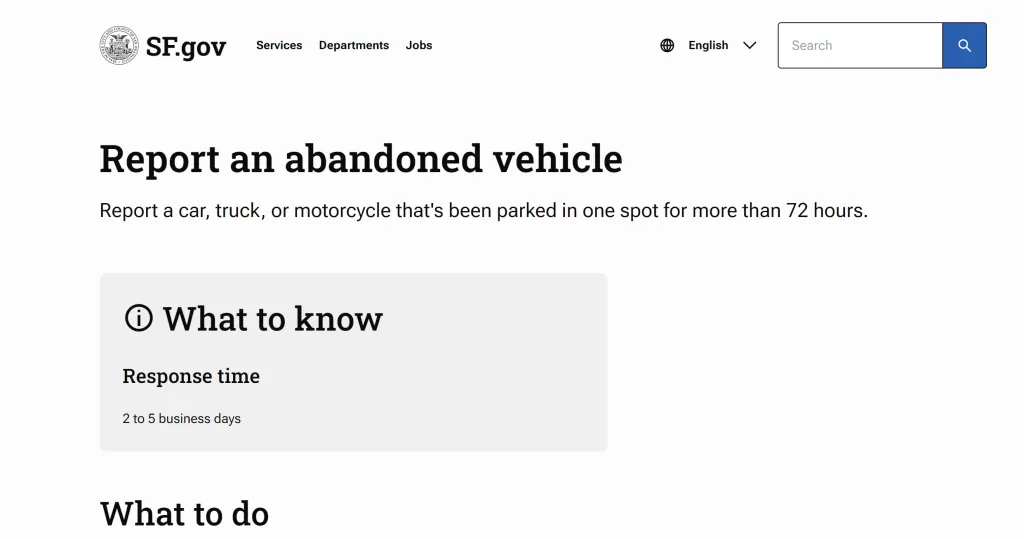
- If you’re buying from a licensed dealer, the risk of ending up with a stolen vehicle is usually very low. Dealers are legally responsible for verifying a car’s history, and selling a stolen car can cost them their license.[↩]
- r/askcarguys [KengisGhan]. (2023, Nov 14) I bought a stolen car with a clean title. How should I proceed? [Online forum post] Reddit. https://www.reddit.com/r/askcarguys/comments/17ux52n/i_bought_a_stolen_car_with_a_clean_title_how/[↩][↩]
- In addition to cases where a vehicle is severely damaged and the repair costs are too high, a salvage title can also be issued due to theft.[↩]
- https://www.autocheck.com/vehiclehistory/backed-by-experian[↩]
- the NCIC doesn’t offer a public portal—individuals can’t access this database directly. That’s why services like Bumper can be valuable, as they provide an indirect way to access data that would otherwise be out of reach for most people.[↩]
- https://www.youtube.com/shorts/rllSKLDWve8[↩]
- r/legaladvice [Kkeeiisshhaa]. (2018, Jul 24) Purchased a stolen car with fake vin. [Online forum post] Reddit. https://www.reddit.com/r/legaladvice/comments/9198hj/purchased_a_stolen_car_with_fake_vin/[↩]
 View all of Jocelyn Sun's posts.
View all of Jocelyn Sun's posts.
